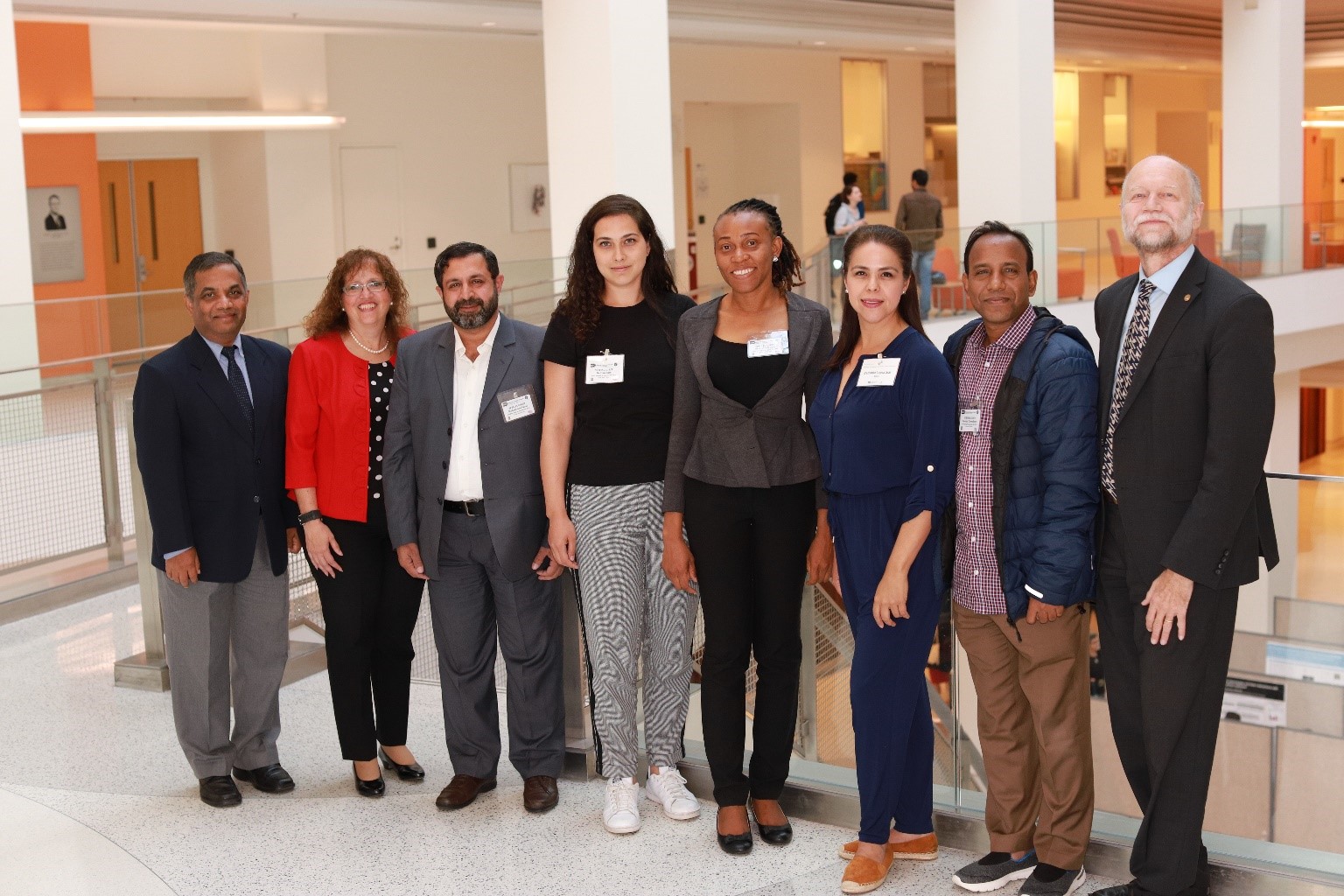Month-long program helps clinician-scientists from foreign nations build knowledge and collaborative research networks

From left to right is Gyan Prakash, Ph.D., the director of NEI international activities; Santa Tumminia, Ph.D., acting director of the NEI; Muhammad Iqbal, Ph.D., fellow, (Pakistan); Meltem Kars, M.D., fellow, (Turkey); Henrietta Ifechukwude Monye, MBBS, fellow (Nigeria); Bethania Lopez Star, M.D., Ph.D., fellow (Mexico); Enamul Chowdhury, M.D., fellow, (Bangladesh); and Max Muenke, M.D., summit program director. Photo: Dustin Hays, NEI
The National Eye Institute (NEI) sponsored and hosted five fellows in September at the 2019 National Institutes of Health (NIH) International Summit on Human Genetics and Genomics.
Since 2016, the month-long annual summit has sponsored fellows from low- or middle-income nations to visit NIH’s Bethesda, Maryland, campus to expand their expertise in clinical genetics and genomics. The curriculum includes coursework, hands-on workshops, tailored lab training, and networking opportunities.
NEI has invested in making the fellowship a success since it began five years ago, observed Gyan Prakash, Ph.D., associated director for International Programs at the NEI. In return, it’s given NEI an opportunity to train early-career international scientists in the area of ophthalmic genetics, which has expanded international participation in clinical research investigations into the genetic basis of eye diseases.
Fellows are selected based on their accomplishments and potential to participate in international research collaborations. Many of the NEI’s 2019 fellows run genetics/genomics projects at home.
Henrietta Ifechukwude Monye, MBBS, an ophthalmology resident at the University College Hospital of Ibadan, Nigeria, studies the perceptions about genetic testing among parents of children diagnosed with genetic eye disease. She noted that the summit empowered her to raise awareness about the potential benefits of genetic testing. “It was also a great opportunity to interact and network, literally, with the world.”
Bethania Lopez Star, M.D., Ph.D., an ophthalmologist with the Mexican Institute of Ophthalmology, Querétaro, is genotyping samples from adults with and without corneal astigmatism to identify traits that predict disease progression.
At the Chittagong Eye Infirmary and Training Complex, Bangladesh, Enamul Chowdhury, M.D., heads a multidisciplinary team that diagnoses and treats retinoblastoma. His team conducts genetic testing to determine if a child’s retinoblastoma is heritable, a form that requires more intense follow-up than the spontaneous form. The team also conducts genetic counseling and screening of at-risk siblings and parents.
Muhammad Iqbal, Ph.D., of the Islamia University of Bahawalpur, Pakistan, studies families with genetic eye disease in rural southern Punjab, a region with a high rate of consanguineous marriage. Iqbal performs DNA extraction locally and collaborates with partners who genotype the clinical samples for studies on inherited basis of eye diseases. His work has identified new mutations associated with retinitis pigmentosa.
Meltem Kars, M.D., a doctorate candidate at Bilkent University in Ankara, Turkey, studies the biomechanical and biochemical properties of the eye under various conditions, such as when it is stressed from the use of silicone oil tamponade in eye surgery.
The summit was coordinated by National Human Genome Research Institute. Information about the summit is available in this videoThis link is external to nei.nih.gov and will open in a new browser window or tab.. Rolling applications start in October every year.